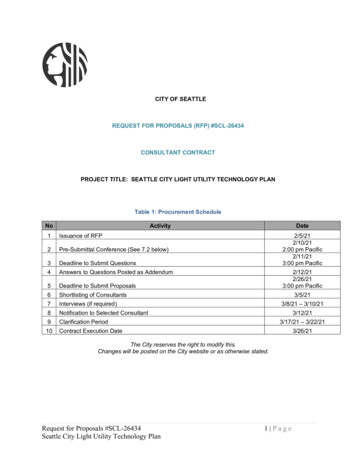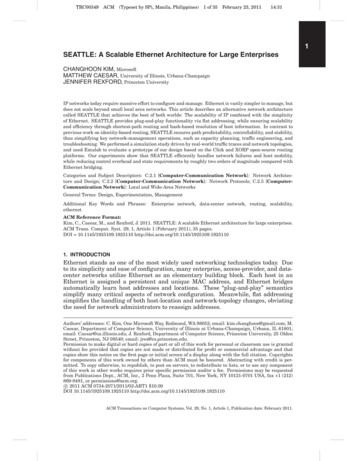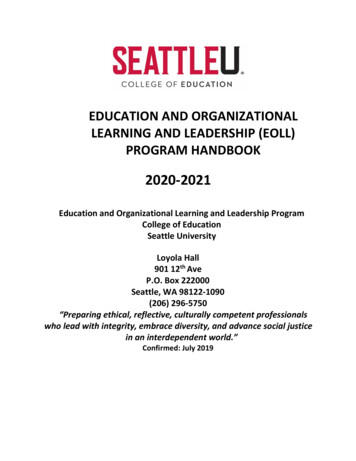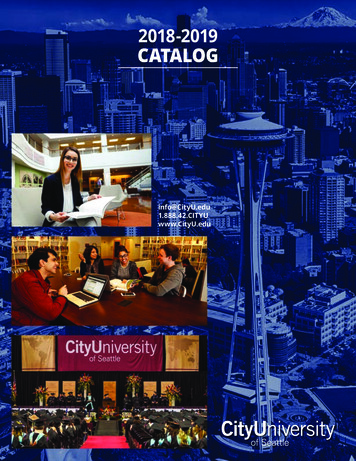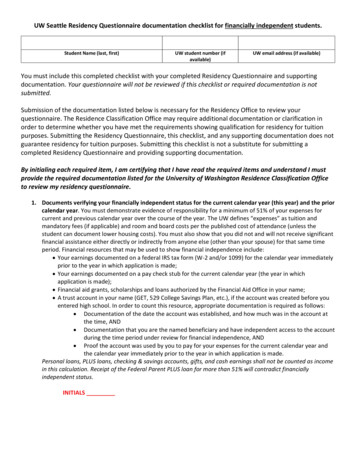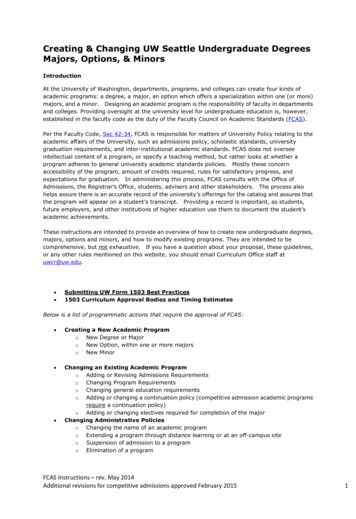
Transcription
Creating & Changing UW Seattle Undergraduate DegreesMajors, Options, & MinorsIntroductionAt the University of Washington, departments, programs, and colleges can create four kinds ofacademic programs: a degree, a major, an option which offers a specialization within one (or more)majors, and a minor. Designing an academic program is the responsibility of faculty in departmentsand colleges. Providing oversight at the university level for undergraduate education is, however,established in the faculty code as the duty of the Faculty Council on Academic Standards (FCAS).Per the Faculty Code, Sec 42-34, FCAS is responsible for matters of University Policy relating to theacademic affairs of the University, such as admissions policy, scholastic standards, universitygraduation requirements, and inter-institutional academic standards. FCAS does not overseeintellectual content of a program, or specify a teaching method, but rather looks at whether aprogram adheres to general university academic standards policies. Mostly these concernaccessibility of the program, amount of credits required, rules for satisfactory progress, andexpectations for graduation. In administering this process, FCAS consults with the Office ofAdmissions, the Registrar’s Office, students, advisers and other stakeholders. The process alsohelps assure there is an accurate record of the university’s offerings for the catalog and assures thatthe program will appear on a student’s transcript. Providing a record is important, as students,future employers, and other institutions of higher education use them to document the student'sacademic achievements.These instructions are intended to provide an overview of how to create new undergraduate degrees,majors, options and minors, and how to modify existing programs. They are intended to becomprehensive, but not exhaustive. If you have a question about your proposal, these guidelines,or any other rules mentioned on this website, you should email Curriculum Office staff atuwcr@uw.edu. Submitting UW Form 1503 Best Practices1503 Curriculum Approval Bodies and Timing EstimatesBelow is a list of programmatic actions that require the approval of FCAS: Creating a New Academic Programo New Degree or Majoro New Option, within one or more majorso New Minor Changing an Existing Academic Programo Adding or Revising Admissions Requirementso Changing Program Requirementso Changing general education requirementso Adding or changing a continuation policy (competitive admission academic programsrequire a continuation policy)o Adding or changing electives required for completion of the majorChanging Administrative Policieso Changing the name of an academic programo Extending a program through distance learning or at an off-campus siteo Suspension of admission to a programo Elimination of a program FCAS Instructions – rev. May 2014Additional revisions for competitive admissions approved February 20151
Submitting UW Form 1503Submission of UW form 1503 is required for all new degrees, majors, options, and minors and allchanges to existing programs. The original form, including signatures of all that apply including: thechair or program director, college curriculum committee and Dean, and any supporting documents,must be submitted to the University Registrar, Box 355850. An electronic copy of the form and thesupporting documents should be sent to Registrar's Curriculum Office by email at uwcr@uw.edu.The following are “best practices” for reducing delays in the review process for the 1503: Submit a clean typed copy of form 1503 and supporting documentation. Avoid strikeouts andrevisions in pen and pencil on the submitted form. For proposed changes to admission and program requirements, provide all of the currentcatalog copy to provide context for the change. Except for signatures, it is a good practice to also submit a completed 1503 and supportingdocumentation electronically. Courses that will be required by a new academic program or are proposed as part of achanged admission or program requirement must be approved or be in the process ofapproval by the University Curriculum Committee. If a new program or a proposed course requirement will affect another department, thatdepartment must be consulted. Form 1503 includes spaces for the signature(s) of thechair(s) of the department affected. If appropriate, memo(s) from affected department(s)can be included in the proposal.The form is available here: UW 1503 LinkExternal NotificationsThe university has existing agreements with other public institutions in the state to assure the bestoutcomes for students and good use of state resources. Below are the two specific agreementsabout notifying these institutions that should be adhered in creating and changing academicprograms Community College notification: Under an agreement through the Washington ICRC ,the university is required to notify community colleges of changes in lower divisionrequirements two years prior to their applying to transfer students from Washington statecommunity colleges. For further information, email uwcr@uw.edu. Public Institution Notification: Proposals for new degrees, new majors or extensionsvia distance or new location require notifications of other public institutions prior to theirfinal approval by the University. For further information on the process, email RobertCorbett at rcorbett@uw.edu.FCAS Instructions – rev. May 2014Additional revisions for competitive admissions approved February 20152
1503 Curriculum Approval Bodies and Timing EstimatesFCAS Instructions – rev. May 2014Additional revisions for competitive admissions approved February 20153
Creating a New Degree or New MajorUniversity Degrees are awarded for satisfaction of general education requirements of theuniversity, completion of program requirements and electives specified for a major, andcompletion of 180 credits of courses with a minimum 2.0 cumulative grade point average. Adegree is distinct from a major in that a degree includes all coursework completed at theuniversity; a major refers to the coursework completed for the focus of the degree.Degrees awarded by the university include the Bachelor of Arts, Bachelor of Design, Bachelor ofScience in Electrical Engineering, etc. and are often referred by informal abbreviations such as“BA”, “BDes.” and “BSEE.” Majors awarded by the university include Biology, English,Environmental Studies, Sociology, etc. The decision whether to propose an academic programas a new degree or a new major depends the conventions of the profession and whether existingdegrees sufficiently capture the type of program of study. A proposal for a new degree shouldinclude a proposal for general education requirements. The minimum requirements for any newdegree are specified in the scholastic regulations.Approvals for a new degree may differ from those for a new major, so the decision to moveforward with a proposed new degree should be done in consultation with the Dean and, ifappropriate, the Provost. Otherwise, the process for approval for a new degree is the same asthat for a new major.Majors provide the focus of an undergraduate program, indicate what students have specializedin during their academic career, and provide opportunities for students to engage deeply in anacademic area as a complement to the short term experiences of general education andself-chosen electives. The content and specificity of courses for a major may differ: a programmay admit students once a year to pursue a shared curriculum as a cohort or may admit yearround with a core of as few as 20 credits. Courses for a major may be required from departmentsoutside the home department. Below are basic policies for a new major. Exceptions to thesepolicies require justification.1. A major should consist of between 50 and 90 credits.2. The credits to complete a major, along with general education requirements and admissionrequirements, should not require students to complete more than 180 credits for theirdegree.3. Majors may be proposed with three types of admission:a. Open Admission: Matriculated students in good academic standing are admitted atany time.b.Selective /Minimum Requirements Admission: Requires students to completesatisfactorily a set of prerequisite courses with a minimum GPA. All students whomeet the minimum requirements are admitted.c.Competitive Admission: Students must complete all minimum requirements to applyand must then compete with the entire applicant pool for a limited number of spaces.4. Majors should include at least 20 credits of core courses, which all students must fulfill. Thesecourses may come from groups, and courses in any given group should be comparable inlearning goals. The intention is to provide a substantive foundation that all students in amajor share. This expectation may be met in two ways:a. in departmentalized or programmatic majors by a set of courses within that offeringunit.b. in interdisciplinary majors by a set of courses that serve to integrate the participatingdisciplines.FCAS Instructions – rev. May 2014Additional revisions for competitive admissions approved February 20154
5. Majors should require that at least 50% of the credits for that major derive fromupper-division (300- and 400-level) courses.6. Proposed catalog copy for a major may explicitly list electives for inclusion in the catalog.Alternatively, proposed catalog copy may indicate that electives may be taken from a list thatis managed by the department. Such lists should be included with the initial proposaldocumentation, with an indication that they will be departmentally managed.7. Majors and degrees that are competitive or admit students directly as freshmen must includea continuation policy that is no more restrictive than the requirements to graduate from themajor.8. Programs requesting that greater than 50% of the credits for that major must be takenthrough the University of Washington must provide justification for that request. On thecondition that adequate academic justification is provided, FCAS will approve such requests.9. Programs shall not present barriers to admission or graduation to students with disabilities.Documentation Required in addition to form 1503: A new degree or major requires adding orextending infrastructure such as faculty oversight, advising, student services, and otheradministrative tasks, and thus will require new or redirected resources. Therefore, FCAS hasapproved guidelines for a brief (2-4 page) rationale for the proposed degree or major. The guidelinesreflect those questions that should be addressed in planning a new degree or major at the university.The rationale will also provide a helpful context for university faculty and others to understand theprogram. Additionally, if the new program is to be offered through distance technology or at anotherlocation, it should also include in the justification responses that address the section of the guidelinesconcerning criteria for approval of a provisional distance program.Process – External Notification for New Degrees or MajorsThe flowchart on page 3 of this document lays out the steps in the approval process at the Seattlecampus of the university for a new degree or major. In addition to the usual steps required for anoption, minor or changes to an existing major, a further step notifying outside institutions is required.The university has agreed to share notices of proposed offerings with other Washington publicinstitutions, including the community colleges. The justification that is to the accompany theproposals as described above, including steps one through five, constitute a Planning Notice of Intent(PNOI) and are shared by submission to the Council of Presidents. Contact rcorbett@uw.edu forfurther information.FCAS Instructions – rev. May 2014Additional revisions for competitive admissions approved February 20155
Creating a New OptionOptions are undergraduate academic programs that overlap with at least 50% of the credits of anexisting major within a department or program and typically allow students to specialize within amajor. Like majors, they are transcripted. All coursework required for the option, including upper andlower division courses, may be counted within the 50%. Departments may recognize their own areasof emphasis within degree programs as an aid to advising, but only formally approved options aretranscripted.Below are the formal policies FCAS has adopted for options:1. A program may offer a standard major with options that a student may choose. (Forexample, a student can earn a BA in Anthropology or a BA in Anthropology with anoption in Archaeological Sciences.) Alternatively, a program may require everystudent to choose one of several options. (For example, students in the Applied andComputational Mathematical Sciences program must choose an option when theydeclare the major.)2. Each option within a major, including the standard major, must share at least a 50%common core. “Common core” courses represent the essential curricular content thatall students in a major are expected to master, and should provide a substantialfoundation for further work in the major.3. The number of total credits for an option should differ by no more than 10 credits fromany other option in the major, including the standard major.4. Open and minimum admission requirement majors may have competitive options aslong as a non-competitive alternative is available.5. Programs offering options may limit the number of options for which a student mayenroll within that program.6. Each option offered within a degree program must be distinct.FCAS Instructions – rev. May 2014Additional revisions for competitive admissions approved February 20156
Creating a New MinorMinors are coherent courses of study at the undergraduate level consisting of 25-35 credits. Studentsare not allowed to receive a minor and a major within the same field of study. Coursework in minorsis not limited to a single department or program. Minors may be interdisciplinary and they mayinclude courses on all three campuses. Such interdisciplinary and tri-campus minors require anadministrative home with advising support on each campus that they are offered. Typically,interdisciplinary minors have an advisory group of faculty who determine appropriate courses forinclusion.Below are the formal policies that FCAS has adopted for regular minors, interdisciplinary minors andcompetitive minors:A. Unit/Departmental Minors1.2.3.4.5.6.7.8.9.25-35 creditsA minimum of 50% or 15 credits, whichever is greater, of 300/400 level courses.A student cannot receive a minor in their major. * (see Interdisciplinary Minors)A minimum of 50% or 15 credits, whichever is greater, must be completed inresidence at the UW campus granting the minor.Minors may request a minimum cumulative 2.0 GPA for courses applied to the minor;higher grade and GPA requirements are subject to additional review.Courses taken Satisfactory/Not Satisfactory will not be counted toward a minor.Students must declare a major and have completed a minimum of 45 credits beforedeclaring a minor.Students must have the advisor in their major sign minor declaration paperwork inorder to ensure that students meet university satisfactory progress requirements.Generally, minors are open to students in good standing at the university.B. Interdisciplinary MinorsInterdisciplinary minors are minors that are composed of courses and content which comefrom more than one area of study.Interdisciplinary minors were created because students are not allowed to minor in theirmajor, but at times the content overlap between the major and an Interdisciplinary minor isunavoidable. To ensure that students are satisfying the intention of the rule disallowing astudent to minor in their major, FCAS created the following policy.1. Interdisciplinary minors must require that 60% of the coursework applied to theminor is taken outside of the student's major(s) requirements. This means theseclasses may not apply both to the satisfying major(s) requirements andinterdisciplinary minor requirements. Note: These credits can count towards the 180credits required for graduation.2. The minor should require some type of . Competitive MinorsIt is strongly encouraged that Minors be open, as they are intended to be flexibleintroductions to a field. Should a department request a competitive minor, the departmenttakes on the following responsibilities for students admitted to the minor:1. The department must provide the student with access to the department advisors.2. The department must have a continuation policy in place for students in the minor.3. The department must provide preferential access to the courses required for theminor to ensure the student can timely complete the minor.FCAS Instructions – rev. May 2014Additional revisions for competitive admissions approved February 20157
Changing or Adding Program RequirementsProgram Requirements include course and grade requirements for fulfilling minors, options andmajors and are also called graduation requirements. Proposed changes to core courses, electiverequirements and other academic requirements must be submitted in a form 1503 providing arationale for the change and current and proposed catalog copy. Except for minor changes such asa renumbered course, it is advisable to provide all of the catalog copy to provide context for thechange. In the case of updating lists of electives, departments may communicate directly with theCurriculum Office. Timing and approvals required for changes to program requirements areillustrated in the chart above. Additionally, changes to grade requirements and continuationpolicies must be submitted on a form a 1503. For changes to or additions of admissionrequirements, see the page on admission requirements for further policies about their approvalSupporting Documentation: In addition form 1503, programs can provide supportingdocumentation such as relevant data about a course or sample curriculum plans. In the case ofadding courses from another program, memos can be provided.Community College notification: Under an agreement through the Washington IntercollegeRelations Committee( http://www.washingtoncouncil.org/icrc/)the university is required to notifycommunity colleges of changes in lower division requirements two years prior to their applying totransfer students from Washington state community colleges.Changing or Adding General Education RequirementsGeneral Education Requirements are the courses required by the university or the college/schoolfor completion of the degree (e.g. BA, BSEE, BFA) in distinction from those required for the major (e.g. English, Oceanography, Painting, etc.). Such requirements may also fulfill admissionrequirements or program requirements for the major. The university’s minimum requirements forgeneral education are specified in the UW Policy Directory in the section on “Scholastic es/policies/SGP/ScholRegCH114.html), which require atleast 40 credits in three areas of study, 12 credits of writing including 5 of English Composition, 5credits of quantitative and symbolic reasoning skills, and 3 credits of diversity. See the policydirectory for exact requirements.Addition or changes to general education requirements follow the same process as those forprogram requirements, with one difference. Each UW college/school sets its own general educationrequirements that must include, but are not limited to, the University’s. Thus, a change to a generaleducation requirement can potentially affect multiple programs. Depending on the complexity of thechange, making such changes may take the submission of multiple 1503s. University generaleducation requirements themselves may only be changed through legislation in the Faculty SenateChanging or Adding Required ElectivesRequir
Creating & Changing UW Seattle Undergraduate Degrees Majors, Options, & Minors Introduction At the University of Washington, departments, programs, and colleges can create four kinds of academic programs: a degree, a major, an option which off
